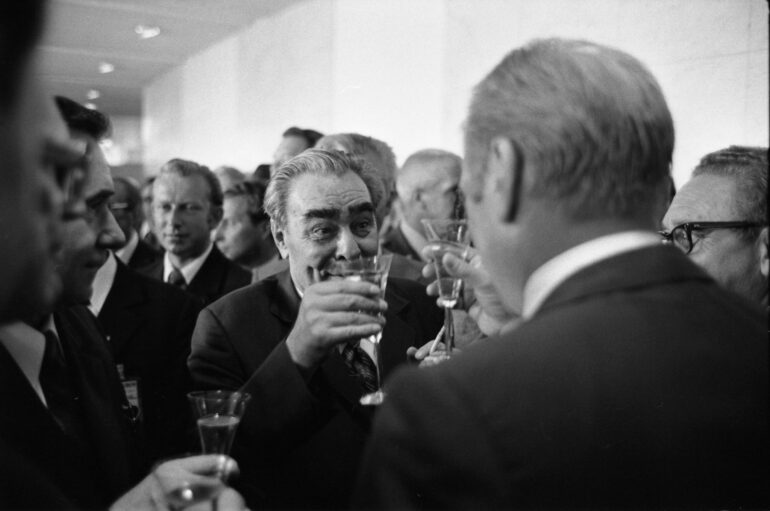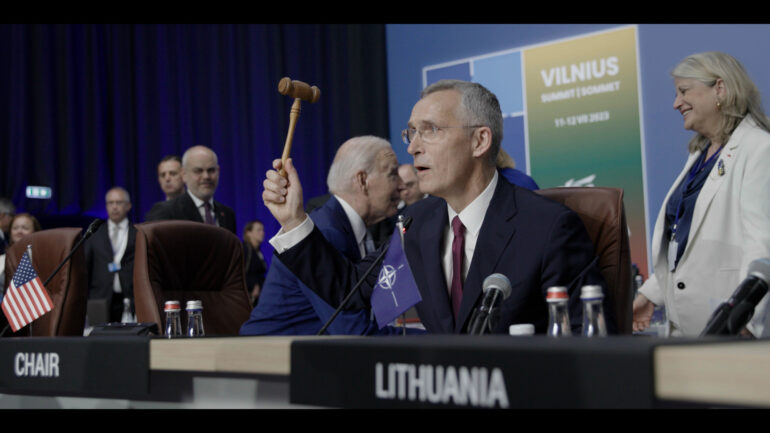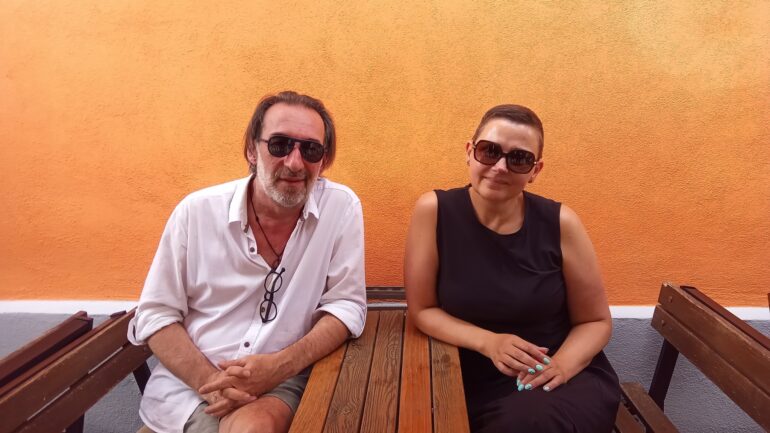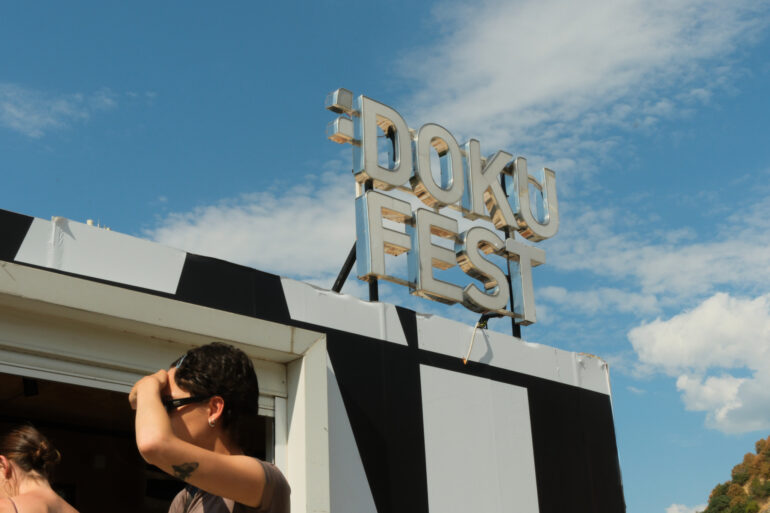Written by: Mariana Hristova
14.08.25
Twelve Nordic productions at the important Balkan documentary gathering.
At this year’s DokuFest in Prizren, Kosovo, on August 1st-9th, Nordic cinema and industry know-how is not just visible – it is integral. Twelve Nordic productions and co-productions ran across the programme, from opening film The Helsinki Effect (Finland/Norway/Germany) to the politically timely Israel Palestine on Swedish TV 1958–1989 (Israel Palestina på svensk TV 1958-1989) (Sweden/Finland/Denmark). Other standouts included the visually striking Only on Earth(Denmark/Sweden/Spain) and The Coriolis Effect (Norway/Netherlands) in the Green Dox Competition, and D is for Distance (Finland) and Facing War (Norway/Belgium) in the View From the World section, tackling urgent questions from climate change though post-truth to the war in Ukraine.
This sustained presence is no coincidence. Since the festival’s biggest Nordic focus in 2013 with nearly 40 titles presented, the relationship has endured on the strength of shared values, complementary cinematic languages, and consistent quality. For DokuFest’s Head of DokuLab, Eroll Bilibani, the draw goes deeper: Nordic collaboration offers a tested framework for building a thriving regional industry.
That philosophy underpins the festival’s newly launched Short Film Forum, co-managed by Bilibani and Jing Haase, and designed to stimulate documentary cooperation between the Nordics and the Balkan region. The Forum is inspired by Nordic approaches to co-production, training, and institutional partnership, adapting these for the local realities.
While officially launched in 2024, the Forum’s roots stretch back to 2012, when Bilibani attended the last itinerant edition of Nordisk Panorama in Oulu, Finland. “I saw how the Nordic countries collaborate, and it was very inspiring,” he recalls. “But I didn’t yet understand what it takes to create something like that. Beyond goodwill and money, you need long-term funding structures and professionals who understand the full scope of the film industry.”
A first attempt in 2017 with the Balkan Documentary Center faltered without sustained backing. The breakthrough came in 2021, when the Swedish International Development Cooperation Agency (SIDA), via the Swedish Embassy in Pristina, awarded DokuFest a three-year grant. Initially a scheme for filmmakers under 30, it evolved into a more strategic, skills-based initiative. “We realised we were simply handing out funds without providing the accompanying know-how,” says Bilibani. “We didn’t want to be just another funding body.”
The answer was a regional short film forum shaped with Haase, whose track record includes the Swedish Film Institute and Nordisk Panorama. Drawing on proven Nordic and Baltic models, they created a format tailored to the Balkans. “We borrowed ideas from forums, training platforms, and pitching events across Europe,” says Haase. “But we built something that speaks to this region.”
The Forum’s debut featured eight projects from Kosovo, Albania, and North Macedonia, with strong international involvement from ARTE/ZDF, The New York Times Op-Docs, Square Eyes, and key Nordic institutions.
Finland’s Yle was among the first to commit, sending long-time commissioning editor and producer Sari Volanen, a leading figure in European short film support. “She’s fantastic,” says Haase. “One of the few buyers of short films in Europe, and she’s already programming films from the Balkans. Her presence gave so much confidence and direction to the filmmakers.”
Other Nordic professionals included Swedish producer Melissa Lindgren, who first came to DokuFest in 2012 as artistic director of Tempo Documentary Festival in Stockholm, exchanging film programmes between the regions, and Jenny Lukkonen from Film i Väst. Lindgren served as an expert at the Forum, holding one-on-one meetings with talents after their pitches, continuing a long-standing collaboration that has seen her contribute over the years as juror, moderator, and mentor. Meanwhile, Lukkonen, apart from serving both on the International Short Dox Competition and the Forum juries, offered essential feedback and visibility for emerging filmmakers. Another Nordic professional at Dokufest this year is the Danish screenwriter and director Hilke Rönnfeldt, who is part of the International Shorts Competition Jury. “They’re not here just because they’re Nordic,” Bilibani clarifies. “They bring expertise we trust. There will always be Nordic professionals at the Forum because their know-how is strong and relevant.”
The collaboration is set to deepen. DokuFest recently secured a new five-year grant from SIDA, allowing the Forum and associated activities to scale up. A country-in-focus model has been introduced, with Scotland featured this year and Italy scheduled for 2026. The most ambitious partnership to date will come in 2027, when Sweden will be the official guest country with what Bilibani describes as “the largest and most prominent Swedish delegation to the Forum”.
Haase says the 2027 focus on Sweden will likely include the participation of one or two Swedish projects pitching alongside those from the Balkans, as well as producers actively seeking co-productions in the region. “We haven’t finalised the format yet,” she explains, “but the goal is to encourage genuine collaboration - not only from within the Balkans, but with experienced producers who can bring a European perspective.”
While the Forum remains anchored in the Balkans, the Nordic model has informed its structure and ambition. “In the Nordic countries, cooperation among neighbours is built into the funding architecture,” says Haase. “There’s cultural affinity, shared languages, and institutions that support collaboration across borders. That’s what we want to build here – an ecosystem that encourages regional production, but with an international outlook. Furthermore, the Nordic countries have created one of the strongest regional film identities in the world,” she continues. “It makes sense to have the same in the Balkans – and we’re already seeing the willingness. After this year’s edition, Montenegro will be signing on as a partner. Others are in the pipeline.”
Thе spirit of inclusive regionalism, paired with strategic Nordic cooperation, is at the heart of DokuFest’s new industry vision. As Bilibani puts it, “We don’t want a closed club of three countries. We want something inclusive, just like DokuFest has always been. The Nordic cooperation helps us think bigger, and act better.”
The Helsinki Effect, Israel Palestine on Swedish TV 1958–1989, Only on Earth and Facing War are supported by Nordisk Film & TV Fond.



